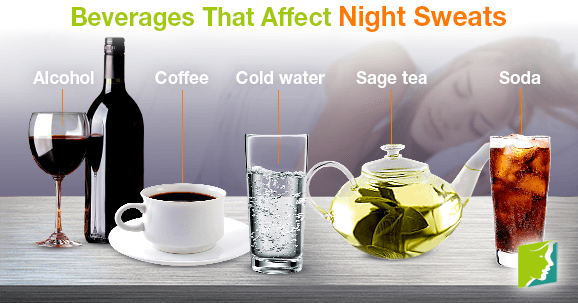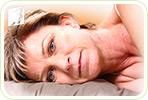Waking up drenched in sweat during the night is an unpleasant - though not uncommon. Many women between the ages of 45 - 55 find that night sweats prevent a restful night's sleep, which often leads to fatigue the following day. Sweats occur primarily due to hormonal imbalances in a woman's body as she approaches menopause that cause the body to falsely detect an increase in temperature and produce sweat to cool down. However, external factors, particularly your choice of evening beverages, also influence the severity of your night sweats; keep reading to see how.
Alcohol
The body can only metabolize alcohol at a rate of approximately one small glass of wine, or just over half a pint of beer, per hour. If alcohol exceeds this rate, the body looks for another way to flush it from its system. This is done partly through urination and partly by passing alcohol out through the skin, as sweat. This means that if you consume considerable quantities of alcohol before going to bed, you are likely to experience sweating during the night; plus, the sweat produced is likely to have the odor of alcohol.
Soda
Most sodas contain a significant amount of caffeine, which is a stimulant that increases activity in the body's sympathetic nervous system. As well as being disruptive to your sleep, the increased activity in this system provokes a natural increase in sweating as the hypothalamus detects an increase in body temperature and reacts to cool the body down by producing sweat. To reduce the risk of night sweating, try to consume water or fruit juice instead.
Coffee
Coffee contains vast amounts of caffeine, so it has a similarly stimulating effect on your body to that of soda. However, as a hot beverage, coffee also raises internal body temperature, so if you drink it before going to bed, your body will most likely produce sweat during the night to cool down, and the distinctive smell of coffee means the sweat is likely to be odorous.
Sage Tea
Sage has sweat-relieving properties that make it an effective herb to consume as a tea before going to bed to reduce night sweats. Like coffee, it is a hot drink, so it may raise your internal body temperature. However, unlike coffee, sage tea does not contain caffeine, so the effect of a hot beverage before going to bed in this context is less likely to be stimulating and more likely to be conducive to a restful sleep.
Cold Water
Remaining hydrated with cool water lowers internal body temperature and reduces the likelihood of sweating excessively during the night. Keep a cold glass of water by your bed to cool down during the night and to replace any fluids lost from night sweats.
Although a cup of milky coffee or large glass of wine may seem like the most relaxing way to wind down after a long day, consuming these types of beverages before going to bed can actually increase the likelihood of an unrestful sleep disrupted by night sweats. Try to limit sweat-inducing beverages to the early evening to give your body a chance to fully metabolize them, and opt for sweat-relieving sage tea and cool, hydrating water right before bed to set you up for a restful night's sleep, sweat-free.
Sources
- National Health Service UK. (2012). Symptoms of the menopause. Retrieved January 23, 2014, from http://www.nhs.uk/Conditions/Menopause/Pages/Symptoms.aspx
- Schilling, C. , Gallicchio, L. , Miller, S. , Langenberg, P. , Zacur, H. & Flaws, J. (2007). Current Alcohol Use, Hormone Levels, and Hot Flashes in Midlife Women. Fertility and Sterility, 87(6), 1483-1486. doi: 10.1016/j.fertnstert.2006.11.033




